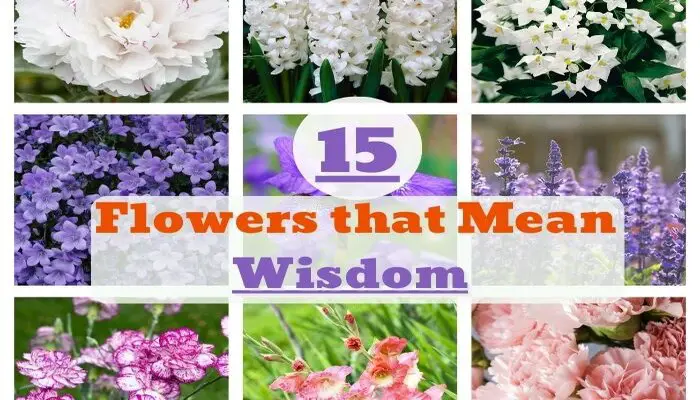Top 15 Flowers That Mean Wisdom: The Perfect Gift!
What many people don’t know is that almost every flower has its own symbolism in the language of flowers, which can express feelings, requests or wishes. Among the many symbolic meanings of flowers, wisdom is one of the most popular.
From the Iris to the Chrysanthemum, there are several flowers that have been associated with wisdom and intelligence throughout history. Some of the most popular flowers that represent wisdom include the Iris, Sage, Gladiolus, Periwinkle, Chrysanthemum, and Hyacinth, among others.
In this article, we’ve compiled a list of 15 stunning flowers that symbolize wisdom. From the delicate blooms of the iris to the vibrant hues of the gladiolus, each of these flowers has its own unique beauty and message.
Join us as we unlock the secrets of these enchanting flowers and discover how they can bring a little bit of wisdom and wonder to your life.
Table with Flowers that mean Wisdom
| Flower Name | Meaning of Flower | Seasons When They Bloom |
|---|---|---|
| Iris | Wisdom, Valor | Spring, Summer |
| Sage | Wisdom, Longevity | Summer, Fall |
| Sunflower | Adoration, Wisdom | Summer, Fall |
| Marigold | Wisdom, Creativity | Summer, Fall |
| Chrysanthemum | Cheerfulness, Wisdom | Fall |
| Gladiolus | Strength, Wisdom | Summer, Fall |
| Pink Carnation | Gratitude, Wisdom | Spring, Summer, Fall |
| Violet | Wisdom, Spirituality | Spring, Summer |
| Bluebells | Humility, Gratitude, Wisdom | Spring, Summer |
| White Jasmine | Amiability, Modesty, Wisdom | Spring, Summer |
| White Peony | Honor, Compassion, Wisdom | Spring, Summer |
| White Poppy | Consolation, Wisdom, Dreaminess | Summer |
| White Lily | Purity, Modesty, Wisdom | Spring, Summer |
| Hyacinth | Understanding, Wisdom | Spring |
| Periwinkle | Friendship, Wisdom | Spring, Summer, Fall |
1. Iris
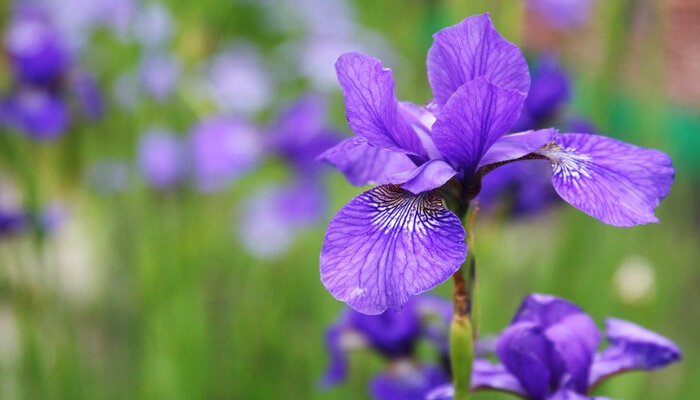
The iris is a beautiful flower that has been valued for its medicinal properties and symbolic meaning for centuries. Its name comes from Greek and means rainbow. The iris, associated with the goddess Iris, who acted as a bridge between Olympus and the earth, symbolizes wisdom and positivity. The iris flower, with its many colors, was named after her.
One fun fact about irises is that they can represent a wide range of colors. These colors include blue, purple, yellow, orange, pink, and in some rare cases black too.
Today, the iris is often used in bouquets and floral arrangements to convey messages of wisdom, respect, and admiration. Its bold colors and unique shape make it a popular choice for weddings, anniversaries, and other special occasions.
Besides the various symbols of irises, one of the most prominent ones is their use as a depiction of wisdom. The irises represent knowledge, intuition, and inspiration. Irises are a great supporter of trusting one’s instinct and connecting with inner wisdom.
The iris is also the state flower of Tennessee and the national flower of France. In art and literature, it has been used as a symbol of royalty, power, and elegance.
Whether enjoyed for its beauty or appreciated for its symbolic meaning, the iris is a timeless and inspiring flower that reminds us of the importance of wisdom and intuition in our lives.
2. Sage
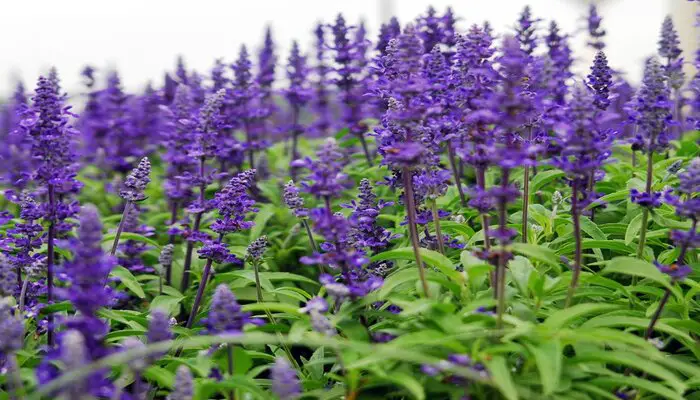
Sage also known as “Salvia”, is a fragrant herb that has been used for medicinal and culinary purposes since ancient times. Its name is derived from the Latin word “salvare,” which means “to heal,” and it was highly regarded by the Greeks and Romans for its healing properties.
Furthermore, their association with wisdom has also been there for centuries now. The way this flower promotes wisdom is that it urges us to connect with our intuition and there’s no superior wisdom than that, right?
As a flower that symbolizes wisdom, sage is associated with knowledge, wisdom, and spirituality. It is believed to have the power to clear negative energy and enhance intuition, making it a popular herb for spiritual practices and meditation.
Today, sage is often used in floral arrangements and as a gift for those seeking wisdom and enlightenment. Its soft, velvety leaves and aromatic scent make it a popular addition to bouquets, wreaths, and centerpieces.
3. Sunflower

Ranging from cream, gold, orange, red, and mahogany, to yellow and chocolate brown, sunflowers are a favorite.
Sunflowers have been cultivated for their beauty and utility for thousands of years. Native to North America, sunflowers were first domesticated by Native American tribes, who used them for their oil and as a food source.
The sunflower has become a symbol of wisdom because of its ability to follow the movement of the sun across the sky. This trait is known as “heliotropism,” and it is a metaphor for the pursuit of knowledge and the search for wisdom.
In many cultures, the sunflower is also associated with loyalty, faithfulness, and longevity.
Furthermore, in other cultures, sunflowers are said to represent the third eye chakra, which itself is directly about spiritual insight, wisdom-based approaches, guidance, and a clarity of thought from within.
4. Marigold
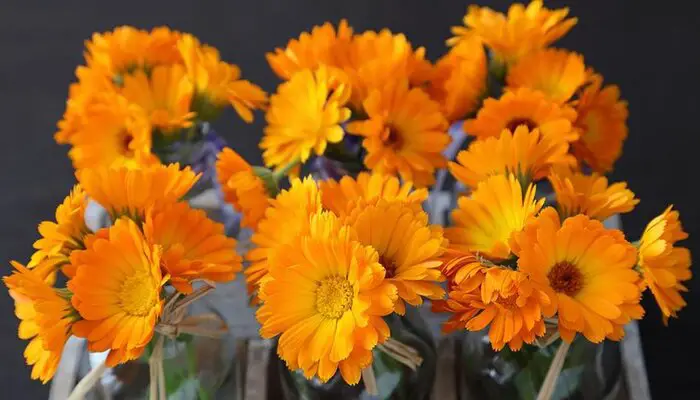
Marigolds have a long and rich history of use in many different cultures. In ancient Greece and Rome, marigolds were used in religious ceremonies and as a medicinal herb. In India, marigolds have been used for centuries in religious ceremonies and as a symbol of purity and good fortune.
It should also be noted that marigolds, due to their cheerful and lively appearance, are said to have a connotation with features of illumination, enlightenment, and clarity.
In other cultures, marigolds are said to have a fiery appearance, as opposed to a cheerful one. Thus, being the perfect reminiscent of sun rays.
The marigold is also associated with wisdom because of its bright and cheerful appearance, which is said to represent the light of knowledge and understanding. In many cultures, marigolds are also used to represent the sun and its life-giving energy.
Marigolds are widely used in religious practices especially when an ode is being given to a person who has passed and was considered a bearer of great wisdom and intelligence.
5. Chrysanthemum
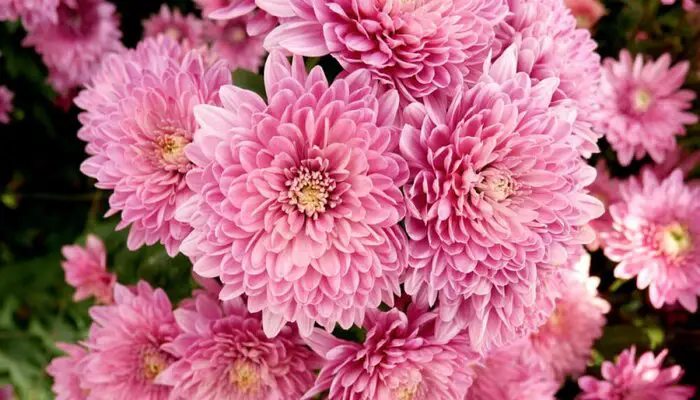
Chrysanthemums have a rich history that dates back to ancient China, where they were first cultivated over 2,000 years ago. The flower quickly became a symbol of royalty and was revered for its beauty and fragrance. It was also used in traditional medicine for its healing properties.
Chrysanthemums are often associated with wisdom because of their long history and cultural significance. In Japan, the chrysanthemum is the national flower and is a symbol of the emperor and the imperial family. In Chinese culture, the chrysanthemum represents longevity, wisdom, and nobility.
Today, chrysanthemums are widely grown for their beauty and are a popular choice for flower arrangements and gardens. They come in a variety of colors and sizes, and their unique shape and texture make them a favorite among gardeners and florists alike.
6. Gladiolus
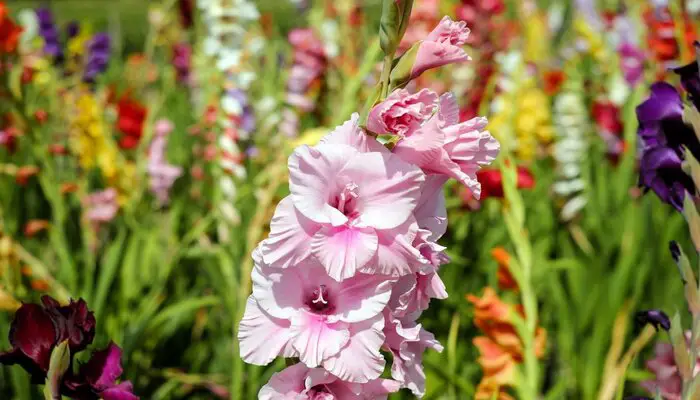
The gladiolus, also known as the sword lily, has a rich history that dates back to ancient Rome. The flower was named after the Latin word “gladius,” which means sword, because of its long, slender shape.
In ancient times, the gladiolus was used in gladiatorial games, where flowers were scattered on the arena floor to honor the victorious gladiators.
Because these flowers are long and slender, just like a possible knife, these flowers have been continuously associated with perseverance, strength, and wisdom. A variety of other cultures hold it at a high place of importance because of its association with honor and respect.
Gladiolus has a special meaning in the language of flowers, where it represents sincerity and strength of character. The flower is often given as a gift to show admiration and respect for someone’s wisdom and perseverance.
7. Pink Carnation
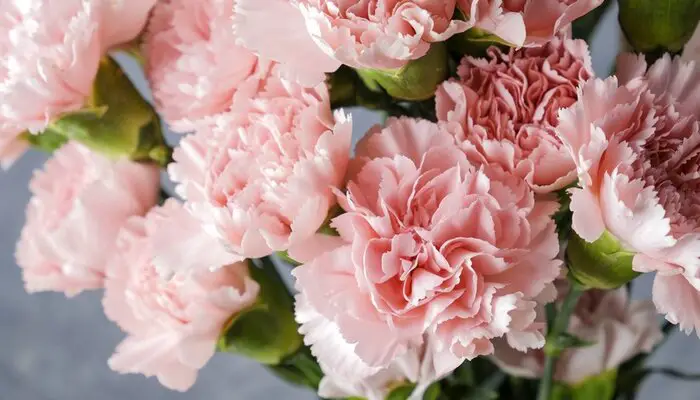
The pink carnation has a rich history that dates back to ancient Greece, where it was believed to have been created by the tears of the goddess Aphrodite. Over time, the flower became associated with the motherly love of the Virgin Mary, and it was often used in Christian artwork and symbolism.
Pink Carnations are said to have a peaceful vibe, with a nurturing nature, which allows them to soothe and calm one’s mind. Due to their gentle nature and understanding, pink carnations are said to hold great wisdom in their existence.
In the language of flowers, the pink carnation represents a mother’s undying love and affection for her children. The flower is often given as a gift on Mother’s Day to show gratitude for a mother’s wisdom, guidance, and unconditional love.
When talking about the appearance of these flowers, they tend to be delicate in their form and come in a wide range of colors, like vibrant fuchsia and pale pink.
Besides being a symbol of wisdom, pink carnations, due to their charming and graceful appearance, are also a great choice for gift-giving.
8. Violet
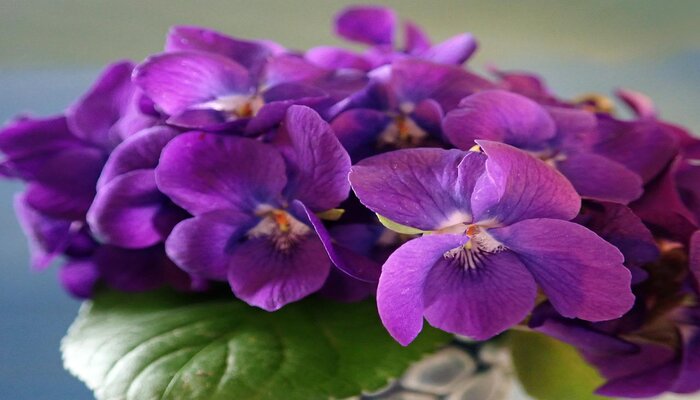
Violet comes from the Latin word “viola”. The most common meanings of the purple flower include innocence, eternal love, modesty, spiritual wisdom, fidelity, mysticism, and remembrance. Also, in Christian history, violets were considered an emblem of humility.
As the official birth flower for the second month of the year, they are a popular gift for young parents in February. Otherwise, they can mean fidelity in love or friendship.
Violet is extremely delicate and is a symbol of wisdom and loyalty , which is why you are usually the friend who advises and whom everyone trusts, especially when they have to reveal a secret.
The color violet is also associated with spirituality and higher consciousness, which are often seen as manifestations of wisdom.
Additionally, in the language of flowers, violets are sometimes used to express the sentiment “let us take counsel together,” which also conveys a sense of wisdom and collaboration.
So, while it may not be as commonly associated with wisdom as some of the other flowers on the list, the violet flower can certainly be a symbol of wisdom in certain contexts.
9. Bluebells
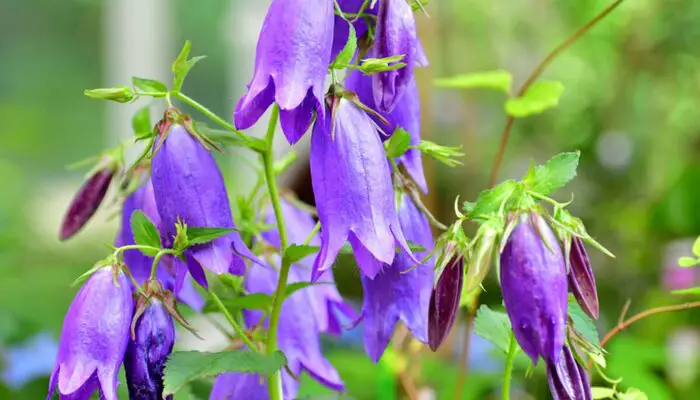
Widely associated with the fairy kingdom, bluebells were for a long time believed to have some sort of magical powers. Furthermore, these flowers are widely favored for their healing properties and date back to medieval times.
These flowers were also used in traditional medicine for their healing properties.
As they have delicate beauty and are usually surrounded by a sense of calm and tranquility, bluebells are associated with wisdom and everything it involves.
Hence, the depiction of humility, gratitude, and appreciation is all the various attributes that these bluebells carry with them, without their captivating colors or their appearance.
10. White Jasmine
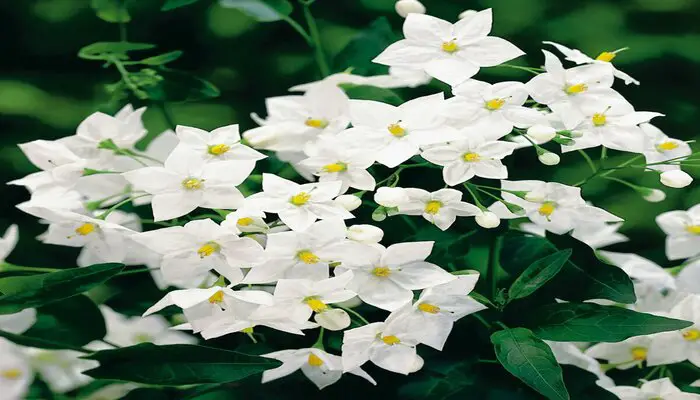
The color white has long been used as a sign of purity, especially among the Persians. Couple the color with jasmine, and you have a symbol of purity and novelty. But this doesn’t end here.
The flower was highly valued for its sweet fragrance and was used in traditional medicine for its calming and healing properties.
White jasmines have a beautiful and soothing fragrance and are said to be associated with enlightenment, self-actualization and awareness, and being in touch with oneself and its needs. Due to the sophisticated appearance of white jasmines, they’re said to inspire wisdom and encourage clarity of thought wherever they’re.
White jasmines take a form of dark green color with slender pointed petals that give the flower a sharp yet delicate look.
White jasmine is often associated with wisdom because of its ability to calm the mind and promote a sense of peace and tranquility. In many spiritual traditions, the flower is used in meditation and prayer to help cultivate a sense of inner wisdom and insight.
11. White Peony
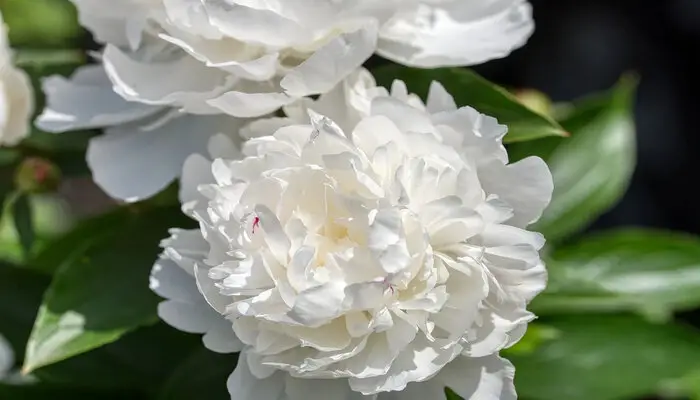
Did you know white peonies have been widely used for hormonal imbalances? These flowers have instilled within them a calming effect which makes them the perfect choice for when it comes to treating anxiety and worry for the future. Hence, it’s an association with wisdom.
These flowers are also a great showcase of grace, intellect, and elegance, all of which are components of wisdom.
They are often associated with wisdom because of their beauty and elegance, and their ability to inspire feelings of grace and dignity. In many cultures, the flower is seen as a symbol of honor, respect, and wisdom, and is often given as a gift to show gratitude and appreciation.
The petals of white peonies are milky white and as soft as you can imagine. These flowers also have a twist to them with slight ruffling at the end of the petals giving the carnations a sort of complexity and edginess.
12. White Poppy
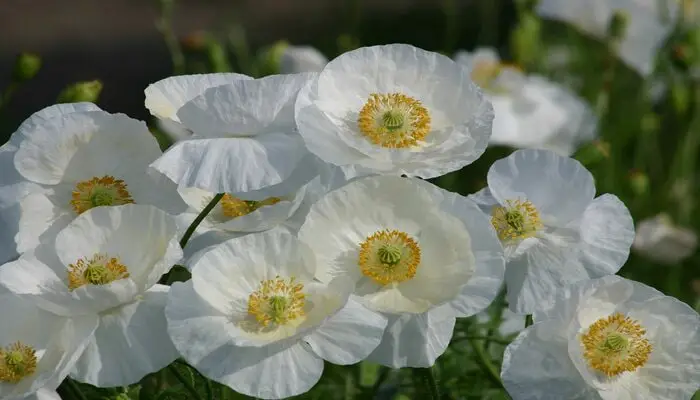
The white poppy has a rich history and is often associated with wisdom due to its symbolic significance. In ancient times, poppies were associated with sleep, death, and rebirth, and were often used in religious and spiritual ceremonies.
White poppies are often seen as a symbol of peace, wisdom, and remembrance. It is used to honor those who have died in wars and conflicts and to promote peaceful solutions to global problems.
As a flower that symbolizes wisdom, the white poppy represents the importance of learning from past mistakes and seeking peaceful solutions to conflicts. It reminds us of the need to be compassionate and understanding and to strive for unity and harmony in our relationships with others.
13. White Lily
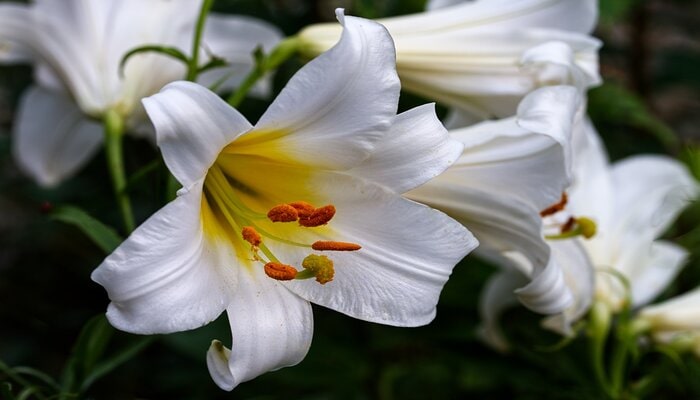
The white lily has been revered for centuries and is often associated with wisdom and spirituality. In ancient times, lilies were seen as a symbol of purity, innocence, and divine grace. They were used in religious ceremonies to represent the Virgin Mary and were a symbol of her purity and wisdom.
As a flower that symbolizes wisdom, the white lily represents the importance of spiritual growth and enlightenment. It reminds us to seek inner wisdom and understanding and to connect with our higher selves and the divine.
The white lily is still widely used in religious and spiritual ceremonies and is a popular choice for weddings and other special events. It is also a common sight in gardens and floral arrangements, where its elegant beauty and delicate fragrance make it a favorite among gardeners and flower enthusiasts.
Because these flowers are a constant reminder of enlightenment, white lilies encourage one to seek inner wisdom and connect with a higher state of spirituality.
14. White Hyacinth
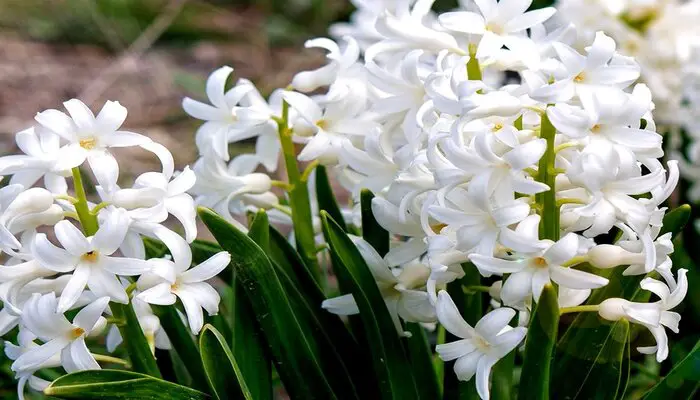
The white hyacinth has a long and interesting history and is often associated with wisdom, humility, and self-awareness. Hyacinth’s name, which in translation from Greek means “flowers of the rains”, means wisdom and unpredictability.
In ancient Greece, the hyacinth was said to have sprung from the blood of the god Hyacinthus, who was killed by the god Apollo. The flower was seen as a symbol of rebirth and renewal and was often used in religious ceremonies.
he reason why these flowers are associated with wisdom is that, in their very existence, they represent the significance of introspection and self-awareness.
White hyacinths repeatedly encourage one to learn from experiences and other mistakes. The tall and upstanding stalks are seen as a showcase of perseverance and resilience while the fragrant blooms are all about purity.
It reminds us to take the time to examine our thoughts and actions, and to learn from our experiences.
Whether given as a gift or enjoyed for its beauty and fragrance, the white hyacinth serves as a reminder of the importance of humility, self-awareness, and spiritual growth.
15. Periwinkle
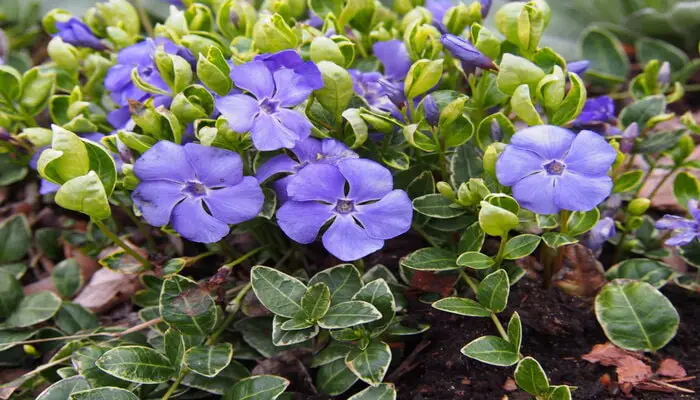
Periwinkle flowers are commonly associated with the quality of wisdom because of their symbolic connection to mental clarity and the power of the intellect.
In traditional folklore and herbal medicine, periwinkle was used as a remedy for a range of cognitive and neurological ailments, such as headaches, memory loss, and vertigo. This association with mental clarity and cognitive function eventually led to the flower being associated with wisdom and intelligence.
Additionally, the periwinkle plant has been used for centuries as a medicinal herb, particularly in the treatment of circulatory disorders, which can affect the brain and other organs.
This healing aspect of the periwinkle plant may have also contributed to its association with wisdom, as physical health and mental clarity are often seen as closely related.
Overall, the combination of its medicinal properties and symbolic associations with clarity and intellect make periwinkle a fitting symbol for wisdom.
16. Solomon’s Seal (Polygonatum)
Solomon’s Seal flower is commonly associated with wisdom, due to its historical and cultural significance. The plant has been used in traditional medicine for centuries, and its root is believed to have medicinal properties that can enhance cognitive function and memory.
Furthermore, the plant’s symbolic significance adds to its association with wisdom. According to the Bible, King Solomon was known for his great wisdom, and the Solomon’s Seal plant is believed to have been named after him due to its perceived resemblance to the symbol of the Star of David, which is associated with King Solomon.
Solomon’s Seal is also believed to have mystical and spiritual properties in various cultural traditions, and is seen as a symbol of protection, healing, and wisdom.
The plant’s unique shape, with its distinctive white flowers and arching stems, is also thought to resemble the shape of a pen, which may further reinforce its association with wisdom and knowledge.
Conclusion
Whether it’s the white peonies that you love or the pink carnations that have your heart, now you know the historical background that surrounds these beauties and the great hand they play in being the bearer of wisdom.
Therefore, next time when you’re looking to change your life or that of someone else, use a wisdom-filled flower to hit the right mark!
Frequently Asked Questions
Some popular flowers that symbolize wisdom include Sage, Iris, Gladiolus, Chrysanthemum, Lavender, Carnation, Lily of the Valley, Sunflower, Hyacinth, and Periwinkle.
Yes, flowers have been used as symbols of various virtues and sentiments for centuries in many cultures. Each flower has a unique meaning and can be used to convey different messages depending on the context.
Yes, a bouquet of flowers that represent wisdom can make a thoughtful and meaningful gift, particularly for someone who values intelligence, knowledge, and introspection. However, it’s always a good idea to consider the recipient’s personal preferences and cultural background when selecting flowers to give as a gift.
Different colors of flowers can have their own symbolic meanings. For example, purple is often associated with wisdom and spirituality, which is why the iris and lavender are both linked with this quality. Yellow is associated with intelligence and clarity, which may be why the gladiolus, a flower with yellow variants, is often associated with wisdom.
Yes, flowers that symbolize wisdom can be used in flower arrangements with other flowers. In fact, combining different flowers with complementary meanings can create a more nuanced and powerful message. For example, combining Sage with Sunflowers can create a message of wisdom and loyalty.

